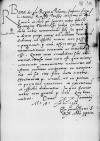Letter #2904
Bona Sforza to Ioannes DANTISCUSCracow, 1546-01-20
| received Heilsberg (Lidzbark Warmiński), 1546-04-04 Manuscript sources:
| ||||
Text & apparatus & commentaryPlain textText & commentaryText & apparatus
Reverendo in Christo Patri, domino
Reverende in Christo Pater, sincere nobis dilecte.
Quae bene valeat.
Ex commissione sacrae reginalis maiestatis propria


 BCz, 3465, p. 320
BCz, 3465, p. 320